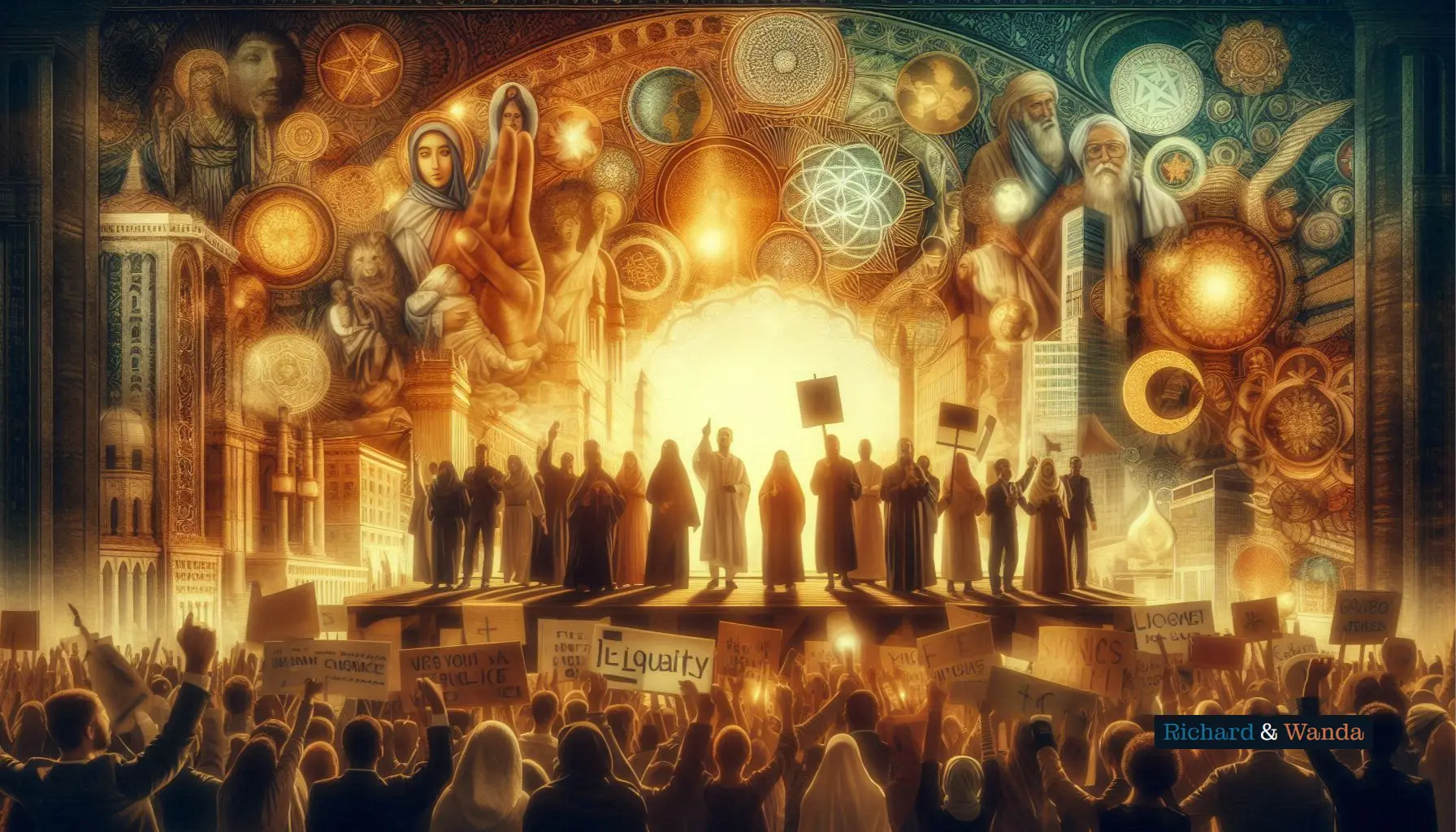What Are the Moral Dilemmas of Poverty and Inequality?
Modern moral dilemmas, such as poverty and inequality, challenge us to act, and faith inspires social action change. These are among the most urgent problems people face today. Although it frequently seems impossible to address these issues due to their size and complexity, history has demonstrated that change is achievable. Faith is one decisive factor that has continuously sparked transformation throughout history. The message of justice has motivated people and groups to take action, face contemporary ethical problems, and oppose oppressive structures—often at considerable personal expense.
Faith as a Catalyst for Social Action
In its purest form, faith is a summons to social action rather than only personal redemption. Many religious traditions’ teachings encourage their followers to speak up for justice, look out for the rights of the underprivileged, and strive toward a society ruled by equality and fairness. This gospel of justice urges people to get involved, speak out against social injustice, and confront the ethical problems brought on by injustice and poverty.
Faith frequently struggles with insecurities, faults, and the more significant and intricate problems of social injustice. When we examine the historical impact of faith on social movements, we find that it motivates people to act for the betterment of those in need. Some of the most significant social shifts of our time have been fueled by it.
Modern Moral Dilemmas: Confronting Poverty and Inequality

Tackling Poverty with Faith-Based Action
The modern world presents moral dilemmas, many of which stem from structural injustice and poverty. These problems involve tackling the more significant causes of injustice and seeking quick fixes for particular difficulties. These moral quandaries frequently lead to faith-based action, which is motivated by the conviction that every person deserves respect and opportunity, regardless of their history, color, or economic standing.
The gospel of justice challenges us to reevaluate the systems that maintain people in cycles of inequality and poverty. Many faith-based groups and activists see the fight against inequality as a fight for justice rather than charity. The gospel urges Christians to act for those unable to assist themselves and strive for a society free from economic inequality where everyone has opportunities for development and achievement.
Faith as a Moral Framework
As we face these contemporary moral difficulties, we must ask ourselves what we can do to combat poverty and injustice in our communities. How can each of us, individually and collectively, have a significant impact? The gospel of justice reminds us that we can fight the systems that trap people in poverty and build a more equitable society by using our faith.
We can respond to these problems by using faith’s moral framework. It motivates us to take proactive steps, like promoting healthcare reform, supporting fair salaries, or trying to end discriminatory behaviors that keep underprivileged areas from prospering. Social justice transforms from a lofty ideal into a task grounded in reality and motivated by faith.
The Role of Faith in Addressing Modern Moral Dilemmas

Faith as a Catalyst for Social Engagement
Faith is crucial in motivating people to take action while considering contemporary moral difficulties, especially social justice. Not only does faith encourage introspection, but it also encourages social interaction. Whether it is combating climate change, racial injustice, or inequality, faith inspires people to take on these challenges head-on because they believe their actions can impact them.
One of the most critical ways faith resolves moral quandaries is by giving people a sense of clarity. Faith gives believers a firm basis on which to base their conduct in a world that occasionally seems morally ambiguous. The gospel urges people to treat one another with love, respect, and justice because it teaches that all people are created equal in God’s eyes. This essential reality frequently serves as the impetus for social movements motivated by faith and gives people the courage to challenge injustice.
Transformation Through Faith
Transformation is another aspect of faith. People who embrace their faith frequently undergo personal transformation, strengthening their commitment to social justice. In this way, faith is about society’s salvation as much as individual salvation. A person who genuinely embodies their faith will work to improve the world by promoting equality, justice, and other people’s welfare.
In many respects, people cannot solve today’s moral problems alone. Instead, they necessitate group efforts. Faith encourages people to behave as a community rather than as individuals, to stand together in solidarity. Faith calls on Christians to unite and oppose the established quo, whether it means working for economic equality, supporting immigrant rights, or addressing environmental disasters brought on by unfair systems.
Social Justice: The Intersection of Faith and Action

Faith and Justice: A Unified Purpose
Social justice is a call to action, not just a theoretical ideal or an academic concept. To attain social justice, we must take action against the structures supporting injustice, poverty, and inequality worldwide. Faith offers a strong justification for becoming active, acting, and advocating for change. Many people and groups have found the courage to defend the weak and disenfranchised because of their faith.
Fundamentally, social justice is about fairness. It is about making sure that everyone, regardless of background, race, or socioeconomic level, has equal chances and is treated with the same respect. According to the gospel, we are all called to serve one another since we are all God’s children. Faith provides the moral direction required to recognize and correct social injustices. As depicted in Stewards of the Light, faith-driven responses to modern ethical dilemmas offer potent lessons on confronting societal issues like poverty and racial inequality.
Faith-Inspired Movements for Change
Social justice and faith are closely related and based on love. Believers are motivated by their faith to care for others, love their neighbors, and strive for a just society. In turn, social justice encourages believers to put their faith into practice by converting their convictions into practical solutions that advance justice and equality.
Faith-based social justice movements have historically led the fight against poverty, inequality, and human rights abuses. People of faith have been crucial in promoting justice, from the civil rights movement to current fights for rights. Their dedication to social justice and faith has brought about long-lasting change and continues to motivate upcoming generations to strive for a more fair and just society.
Modern Moral Dilemmas: Addressing Injustice through Faith-Based Action
The Call to Act in the Face of Injustice
Faith-based activity is crucial in addressing the contemporary moral quandaries that afflict our world. Poverty, inequality, and racial injustice, among other issues, force us to make tough choices. How can we reconcile the injustices we witness daily with our faith? What steps can communities and individuals take to address the underlying causes of these issues?
The foundation of faith-based social action is that we are all accountable to one another. The gospel encourages us to care for the weak, the oppressed, and the impoverished and to love our neighbors as ourselves. Believers are compelled by this belief to defend justice and oppose the structures that uphold inequity. The themes explored in Stewards of the Light remind us that faith is not just a personal journey but a call to address the modern moral dilemmas that shape our world.
Faith-Based Solutions for Long-Term Change
For instance, many religious institutions have committed their funds to fighting problems like homelessness, poverty, and poor health care. These groups know that social justice entails tackling the systemic injustices that give rise to these issues and offering short-term assistance. Their religiously motivated work proves faith’s ability to propel significant societal transformation.
Social activity rooted in faith has a transforming effect. It pushes people to put the larger good ahead of their personal needs. It forces people to behave justly, humbly, and compassionately. The likelihood of long-lasting change increases as more people and communities participate in this activity. Our faith gives us the optimism that we can change the world and the courage to face today’s moral quandaries.
Conclusion
Faith is an active force that propels social action; it is not a passive belief. The gospel of justice challenges us to interact with the outside world, face contemporary ethical problems, and strive for universal social justice. When it motivates people to take action, faith can change entire communities.
It is crucial to remember that faith provides the moral clarity and fortitude required to act when confronted with today’s ethical dilemmas. Faith offers us the means to change things, whether fighting oppressive regimes, promoting social justice, or addressing inequality. The gospel of justice is a call to action that changes the world, not merely a spiritual ideal.
